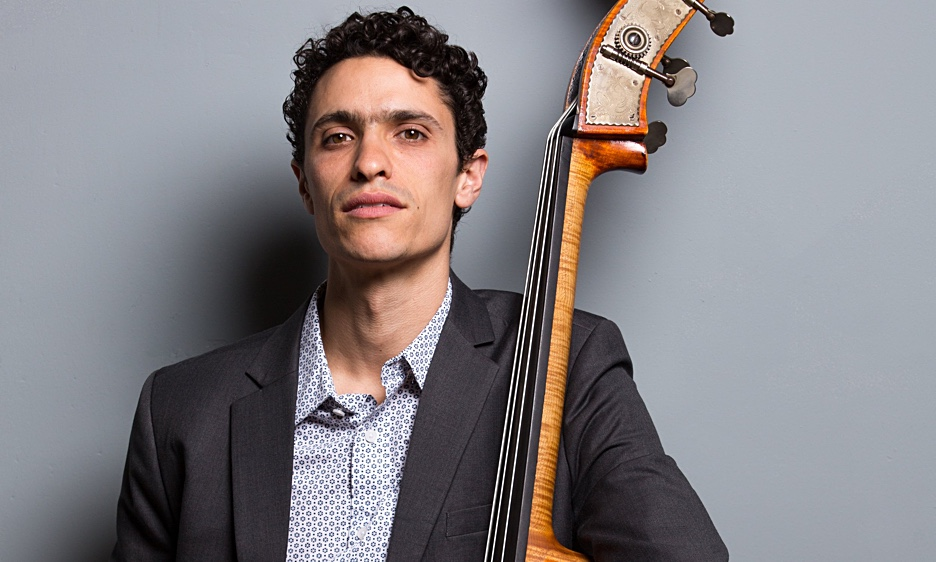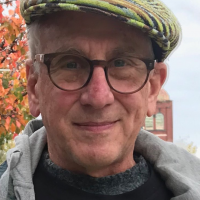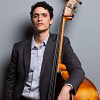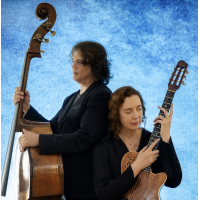Home » Jazz Articles » Profile » Noah Garabedian: The Power of Patience
Noah Garabedian: The Power of Patience

Courtesy Stephen McFadden
I understood what the bass does, what its function is, and I was drawn to how it galvanizes the band and steers the ship.
—Noah Garabedian
Growing up in Berkeley, a hothouse of young jazz talent, Garabedian never intended to become a working musician. "I definitely did not want to go to a conservatory," he said on a video call from Brooklyn. "Also, to be honest, I wasn't very good in high school. So, if I had gone to a conservatory, it probably would not have been a high-level one, but I knew that I really enjoyed music."
That high school, Berkeley High School, has an alumni list that reads like a roll call of poll winners: trumpeters Ambrose Akinmusire, Steven Bernstein and Jonathan Finlayson, pianists Rodney Franklin and Benny Green, and saxophonists Peter Apfelbaum, Joshua Redman and Dayna Stephens, who was one of Garabedian's teachers.
Garabedian called that legacy, "inspiring, but also a very intimidating scene. I would say it was a supportive community, but if you weren't developing, you weren't practicing, you weren't playing as at a certain level where the rest of the band was, they kind of let you know."
A self-described "huge rock fan and huge rap fan," he picked up the electric bass in middle school, inspired by Brick Fleagle of the Red Hot Chili Peppers and Primus's Les Claypool.
Then his father, a music fan, took him to Yoshi's and his direction changed when he saw the upright bass. "I just thought it was a really cool-looking instrument. I really fell in love with the sound and the way it looked," he said. "I didn't really know at the time what role the bass played in a traditional 'jazz' context, but once I started playing jazz, I understood what the bass does, what its function is, and I was drawn to how it galvanizes the band and steers the ship."
Yet despite a burgeoning love for the instrument and a desire to keep music in his life, Garabedian was hesitant about pursuing a musical career.
Shunning the conservatory track, Garabedian enrolled in the ethnomusicology program at UCLA. "I was really drawn to kind of the social aspect of music, how music develops within a culture and why. Also, how the music impacts and influences a culture."
This academic track broadened Garabedian's musical horizons and perhaps unwittingly, made him a more complete musician. He played in the university's Balinese gamelan ensemble, the West African drumming ensemble and the Balkan ensemble. Yet at the same time Garabedian was gigging around LA on bass. "I started paying rent through gigs and I guess from there, I just figured I'd keep going. You know, nobody ever told me to stop playing."
In August 2008, he made the big move to New York, "I was living pretty comfortably in Los Angeles, and I just decided to change everything up," he said. "I ended up going to NYU for my master's and met a lot of great people there, but I guess I just wanted to see what else was out there."
So it has been patience, not ambition that has marked Garabedian's path to a career that has included tours with saxophonist Ravi Coltrane, drummer Jeff Tain Watts, pianists Andy Milne and Kris Davis and co-leadership of the cooperative trio Ember with saxophonist Caleb Wheeler Curtis and drummer Vinnie Sperazza.
Garabedian has recorded with that band and issued two solo recordings, Big Butter and the Eggmen (BJU Records, 2014) and Consider the Stars Beneath Us (Outside In Music, 2022), the latter featuring Dayna Stephens, pianist Carmen Staaf and drummer Jimmy McBride.
The latter recording was dedicated to Garabedian's father, Peter, who died at 93 in 2020, just before the pandemic changed the world. "It isn't a tribute album," Garabedian insists. It's not a eulogy and it's not an album to mourn his loss."
Yet the music glows with a banked-fire intensity, a quiet inner flame that doesn't reach out and grab the listener as much as it draws her or him closer to its warmth. Garabedian's writing is crucial here, but so is his choice of musicians.
"Dayna was one of my very first teachers, my first summer playing bass in eighth grade at Feather River Jazz Camp in the Sierras," he said. "He also was my brother [Raffi Garabedian]'s saxophone teacher. I've known Carmen [Staaf] for a long time and I just love Carmen so much. Jimmy [McBride] and I have done a bunch of gigs together. Jimmy is a super open player and he's very malleable. He's open to all different styles and sounds."
Like the band assembled for Stars, Ember arose from deep personal connections. "[Curtis] used to work at the old Jazz Gallery. We became friends and we actually lived together for a while. He's one of my oldest and closest friends in New York," Garabedian said. "I've also known Vinnie for a long time, and we've played a lot together. We were hanging out a bunch and playing sessions, and just figured we should record."
When he has the time, pianist and composer Orrin Evans makes the trio a quartet, but Garabedian, Curtis and Sperazza are the core of the band—if that's what Ember is.
"It's more than a band," Garabedian asserted. "It's like this place for us to talk and learn and develop, and it's a very supportive situation. Our rehearsals are usually just us talking, to be honest. Then we'll improvise for 30 minutes and then we just talk a little more."
Discourse, the back-and-forth of it, is what gives Garabedian's music its engaging intimacy. That and patience.
Tags
Profile
Noah Garabedian
John Chacona
Fully Altered Media
United States
New York
New York City
Berkeley
ambrose akinmusire
Steven Bernstein
Jonathan Finlayson
Rodney Franklin
Benny Green
Peter Apfelbaum
Joshua Redman
Dayna Stephens
Flea
Red Hot Chili Peppers
primus
Les Claypool
Yoshi's
Los Angeles
Ravi Coltrane
Jeff "Tain" Watts
Andy Milne
Kris Davis
Ember
Caleb Wheeler Curtis
Vinnie Sperazza
Carmen Staaf
Jimmy Mcbride
Raffi Garabedian
Jazz Gallery
Orrin Evans
PREVIOUS / NEXT
Noah Garabedian Concerts
Support All About Jazz
 All About Jazz has been a pillar of jazz since 1995, championing it as an art form and, more importantly, supporting the musicians who make it. Our enduring commitment has made "AAJ" one of the most culturally important websites of its kind, read by hundreds of thousands of fans, musicians and industry figures every month.
All About Jazz has been a pillar of jazz since 1995, championing it as an art form and, more importantly, supporting the musicians who make it. Our enduring commitment has made "AAJ" one of the most culturally important websites of its kind, read by hundreds of thousands of fans, musicians and industry figures every month.

























